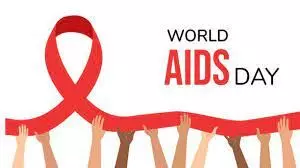HIV/AIDS victims urge NIMR to stop charging service fees for drugs

The Network of People Living with HIV/AIDS in Nigeria (NEPWHAN) has appealed to the Nigeria Institute of Medical Research (NIMR) to remove service fees attached to accessing HIV/AIDS drugs in its facility.
Mr Patrick Akpan, Coordinator of its Lagos chapter, made the appeal in an interview with the newsmen on Thursday in Lagos.
The interview was part of the activities to commemorate this year's 2022 World AIDS Day.
The World AIDS Day, celebrated annually on Dec. 1, is meant to solicit international support for people living with the disease and to remember those who died of AIDS-related illnesses.
The theme of this year's celebration, "Equalize," is a call to action to ensure access to rights, services, resources, and the best science and medicine to end AIDS.
Akpan said the service fees paid before accessing antiretroviral drugs constitutes a barrier to HIV/AIDS treatment in NIMR.
"Though the antiretroviral drug is free, a situation where you have to pay N1,000 service charge before getting one month drugs is burdensome.
"Now, we are not doing one month drug dispensing-again, since COVID-19, we have shifted to multi-month dispensing (MMD)," he said.
Multi-month dispensing refers to the provision of multiple months' supply of antiretroviral medicine and/or other medicines at a single time point.
People living with HIV and currently on antiretroviral therapy receive either three or six months of antiretroviral medicine at their most recent antiretroviral medicine pick-up.
"If you want to take six months of antiretroviral medicine at NIMR, you need to pay N6,000; this has become a challenge because if someone doesn't have the money, he won't be able to collect the drugs.
"The situation is different at other health facilities as there's no service charge attached to collection of antiretroviral medicine in all General Hospitals in Lagos.
"Those fees are also not applicable in Lagos University Teaching Hospital.
"Many of us left NIMR because we couldn't cope, and I know that those remaining are also finding it difficult," he said.
Akpan noted that the financial cost incurred for HIV treatment had plunged many people living with HIV/AIDS into untold hardship and poverty.
"Funders are no longer paying for CD4 count test, but physicians feel the test is necessary so they can know the type of treatment regimen to give to a patient.
"The CD4 cell count is an indicator of immune function in patients living with HIV. The test is good for our people because it measures the strength of the immune system and effectiveness of treatment.
"CD4 test costs N8,000 at NIMR, routine Liver Function Test costs N4,000, Consultation fee is N2,000. If you add these costs to the six months MMD service fees, that's N20,000.
"How can an average person go to the hospital and spend N20,000 to access drugs and test, and we are saying we want to end AIDS in 2030?," he queried.
According to him, when the Network met the management of NIMR on eliminating the MMD service fee, they were told the service fee was critical to the operation of the health facility.
"Once again, we are seizing the opportunity of WAD to appeal to NIMR and the Federal Government to eliminate this fee or review it to an amount our people can easily pay," he pleaded.
Akpan stressed that access to antiretroviral therapy expands adherence to treatment in order to attain viral suppression for people living with HIV and to prevent infecting other people with the virus.
"This will enhance the prevention and management of HIV-related infections and assist the country attain its quest to eliminate AIDS by 2030," he explained.
The UNAIDS World AIDS Day report 2022 reveals that inequalities are obstructing the end of AIDS.
The report called for urgent action to tackle inequalities so as to get the world's AIDS response firmly on track.



